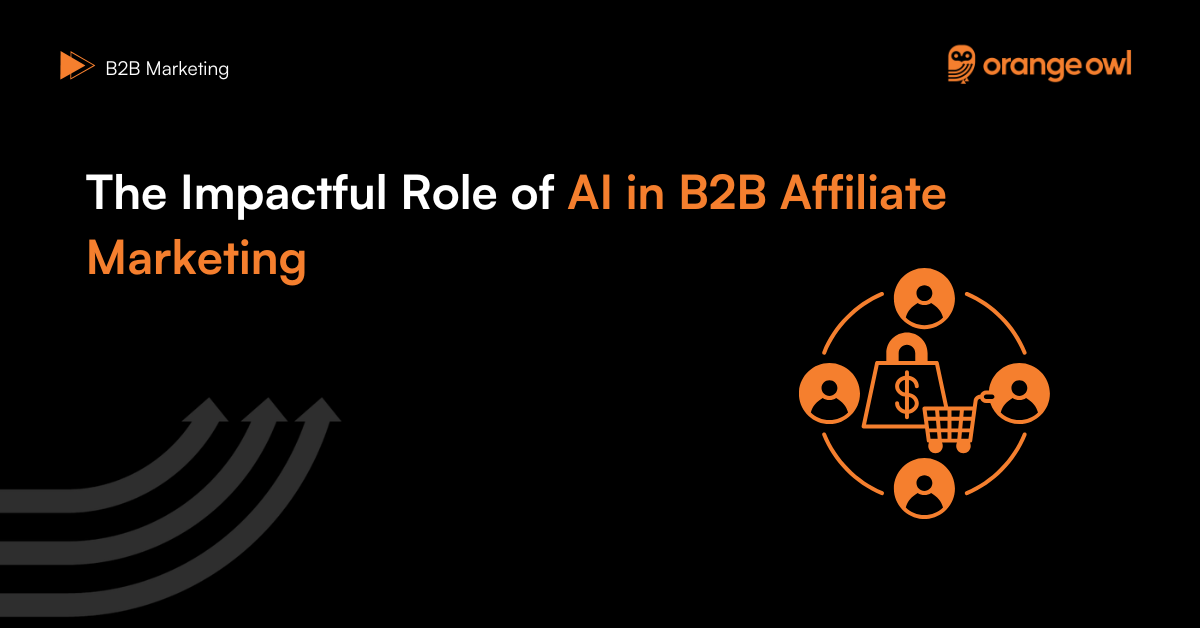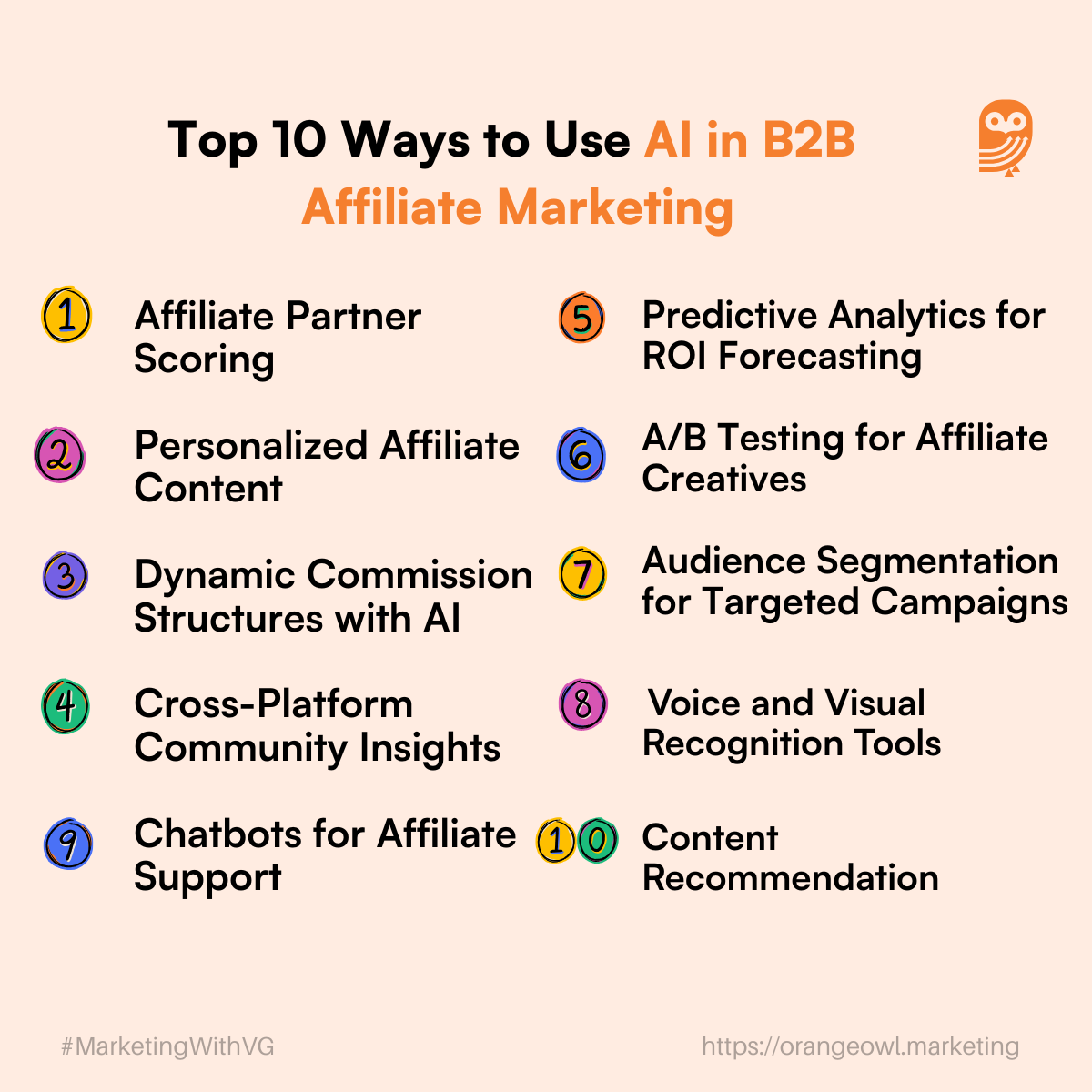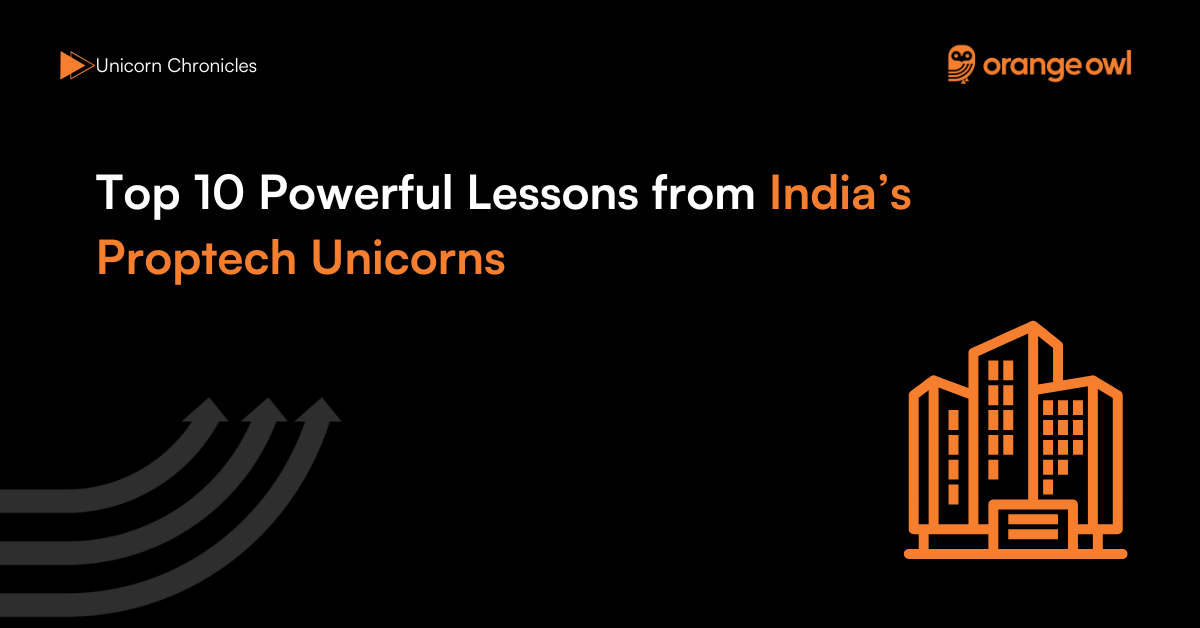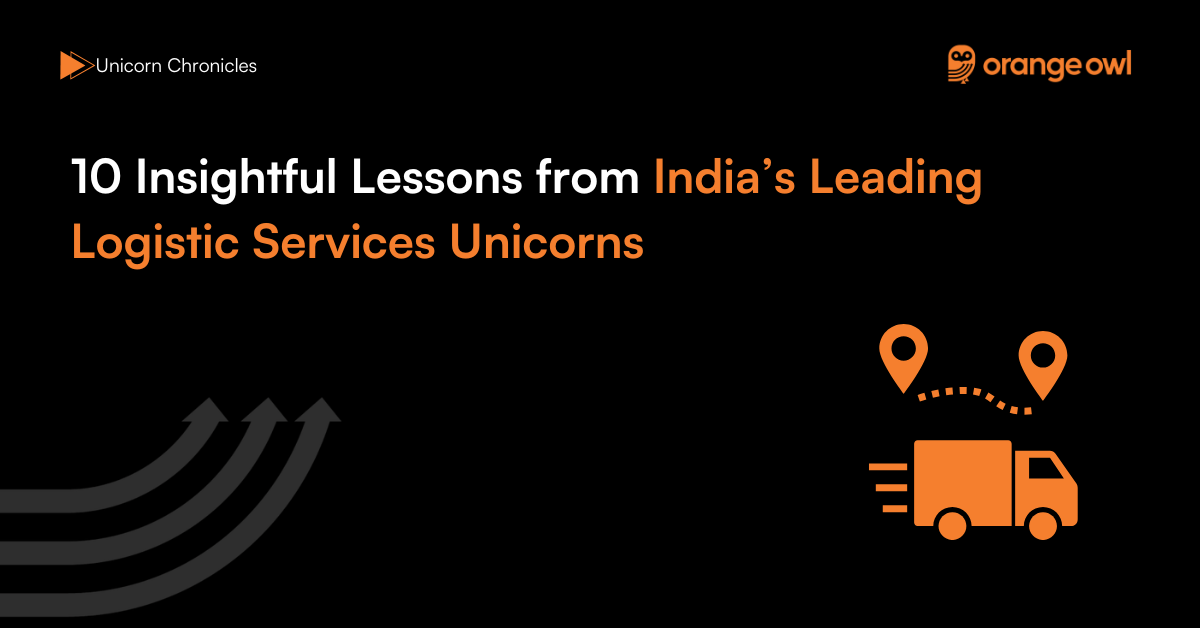The Impactful Role of AI in B2B Affiliate Marketing
Vivek Goel
April 4, 2025

Table of Contents
Introduction
The Role of AI in Affiliate Marketing is revolutionizing how brands engage with audiences and drive performance at scale. By leveraging artificial intelligence, marketers can automate partner selection, personalize promotional content, and uncover actionable insights from large data sets—resulting in more efficient and profitable affiliate programs.
Affiliate marketing has grown into a major revenue channel, contributing over $12 billion annually to global e-commerce sales. As competition intensifies, brands are turning to AI to optimize operations, improve campaign targeting, and strengthen relationships with affiliates. According to WeCanTrack, affiliate programs that utilize AI-powered personalization have experienced up to a 30% increase in conversion rates. Additionally, AI-enabled fraud prevention tools have helped reduce 28% fraudulent clicks, improving cost-efficiency and protecting brand integrity.
This blog explores how AI is transforming affiliate marketing through smarter targeting, fraud detection, real-time optimization, and predictive analytics—empowering marketers to scale performance while staying agile in an increasingly data-driven landscape.
What is AI in B2B Affiliate Marketing?
AI in B2B affiliate marketing refers to the application of advanced technologies such as machine learning (ML), natural language processing (NLP), predictive analytics, and automation algorithms to improve and optimize the various components of affiliate program management.
Traditionally, affiliate marketing relied heavily on manual processes—identifying potential partners, negotiating deals, analyzing performance, and distributing commissions. With the integration of AI, these tasks can now be streamlined, automated, and enhanced with data-backed intelligence.
AI helps brands and affiliate managers to:
- Streamline Partner Selection: By analyzing historical data, audience overlap, content quality, and engagement metrics, AI can identify high-potential affiliates whose audiences are most likely to convert. This eliminates guesswork and enhances alignment between brand goals and affiliate capabilities.
- Dynamically Adjust Commissions: AI tools can automatically adjust commission structures in real time based on affiliate performance, traffic quality, conversion rates, and sales volumes. This ensures fair compensation and incentivizes top-performing partners.
- Identify High-Performing Content and Channels: AI can analyze which creatives, landing pages, and platforms (e.g., social media, blogs, YouTube) are generating the most traction, allowing brands to allocate resources to what works best.
- Deliver Personalized Promotions: With behavioral data, AI enables hyper-personalized promotions by tailoring affiliate banners, product recommendations, and CTAs to individual users based on their preferences, purchase history, and real-time interactions.
- Optimize Ad Placements in Real-Time: AI continuously monitors user behavior and engagement to determine the best placements and timings for affiliate ads, improving visibility.
- Automate Reporting and Insights: AI-powered dashboards provide real-time, data-rich reports with trend forecasts, affiliate contribution breakdowns, ROI analysis, and actionable suggestions—freeing marketers from time-consuming manual tracking.
These AI-driven capabilities not only increase the efficiency and scalability of affiliate programs but also make them far more performance-oriented and data-driven. As a result, businesses can respond faster to market changes, deepen relationships with affiliates, and achieve stronger campaign outcomes.
Why is AI Important in B2B Affiliate Marketing?
In the B2B (business-to-business) space, affiliate marketing operates on longer sales cycles, higher-value transactions, and more complex buyer journeys compared to B2C. This makes AI a vital enabler, helping marketers navigate data complexity, identify high-value opportunities, and drive scalable growth.
1. Smarter Affiliate Partner Selection
In B2B marketing, choosing the right affiliate partner is critical due to the niche nature of audiences and the specialized products or services involved. AI simplifies this process by analyzing multiple data points—such as content relevance, historical lead quality, conversion performance, and industry alignment—to identify affiliates with proven influence over the target market.
For example, AI might discover that a tech-focused blog consistently delivers qualified leads for a SaaS product, even if that blog isn’t the highest in traffic. This type of intelligent matchmaking reduces time-consuming manual outreach and ensures better ROI by aligning affiliate partnerships with business goals and customer profiles.
2. Personalized Promotional Strategies
Unlike B2C, where decisions are often emotional or impulsive, B2B buyers rely on research, logic, and multi-touch journeys before committing to a purchase. AI enhances personalization by tracking how different roles within a buying committee interact with affiliate content and by tailoring messages accordingly.
It can serve custom affiliate content based on company size, industry, intent signals, or stage in the funnel. For instance, a CFO may see ROI-focused messaging, while a CTO gets detailed technical specs—all delivered through the same affiliate channel, increasing trust, engagement, and lead-to-customer conversion rates.
3. Real-Time Campaign Optimization
B2B campaigns require constant fine-tuning due to varying deal cycles, decision-maker involvement, and traffic quality. AI enables real-time optimization of campaigns by monitoring performance indicators like CPL (Cost per Lead), MQL (Marketing Qualified Lead) rates, and pipeline contribution.
It can dynamically reallocate budgets, pause underperforming creatives, or prioritize affiliates who are driving high-intent traffic. This ensures marketing agility, maximizes efficiency, and supports performance-focused scaling—especially useful in B2B environments where every lead matters.
4. Fraud Detection and Prevention
Affiliate fraud in B2B can be particularly damaging, as fake leads or low-quality traffic not only waste resources but also corrupt CRM data and sales pipelines. AI combats this by analyzing click behavior, device usage patterns, IP anomalies, and session durations to detect fraudulent activity in real-time.
For example, AI can identify cookie stuffing or lead farming tactics, flag suspicious referral sources, and automatically block repeat offenders. This proactive fraud detection saves costs, protects brand reputation, and ensures the integrity of affiliate-driven leads in high-value markets.
5. Advanced Analytics and Reporting
AI-powered analytics transform vast volumes of affiliate data into clear, actionable insights. In the B2B space, this includes tracking complex conversion paths, mapping multi-touch attribution, and forecasting pipeline revenue.
Marketers can gain granular insights into:
- Which affiliates influence decision-makers at different funnel stages
- How content types perform across buyer personas
ROI metrics segmented by vertical, geography, or business size
Top 10 Ways to Use AI in B2B Affiliate Marketing
Use Case 1: AI-Driven Affiliate Partner Scoring
AI algorithms analyze a range of metrics—including past performance, niche relevance, audience demographics, and engagement quality—to score affiliate partners. This intelligent scoring system allows marketers to identify high-potential affiliates who are more likely to drive meaningful results. It streamlines partner selection, minimizes manual outreach, and improves campaign targeting.
Hypothetical Example:
A fashion retailer targeting Gen Z leverages AI to assess over 500 potential affiliates. The system ranks influencers based on engagement rates, content authenticity, and alignment with Gen Z interests. By partnering with the top-scoring influencers, the brand sees a 30% increase in affiliate-driven sales within the first month.
Use Case 2: AI-Powered Personalized Affiliate Content
AI customizes affiliate content—such as banners, landing pages, and email CTAs—based on user data like browsing behavior, purchase history, device type, and location. This ensures highly relevant experiences for end users and improves the likelihood of conversion.
Hypothetical Example:
A SaaS company tailors affiliate landing pages using AI, displaying content based on whether a user is an enterprise lead or a startup founder. This targeted messaging increases affiliate-driven conversions by 28%, improving ROI on partner traffic.
Use Case 3: Dynamic Commission Structures with AI
AI dynamically adjusts affiliate commission rates in real-time based on factors like conversion quality, lead volume, customer retention, and average order value. This creates a performance-driven ecosystem that rewards affiliates who deliver better outcomes.
Hypothetical Example:
An e-commerce platform uses AI to increase commissions for affiliates who bring in high-LTV customers. As a result, top affiliates feel more incentivized and continue promoting the brand actively, leading to a 25% improvement in partner retention.
Use Case 4: Real-Time Fraud Detection
AI continuously monitors traffic patterns and user behaviors to detect fraudulent activities like bot clicks, fake signups, and cookie stuffing. It enables faster and more accurate detection, protecting businesses from payout losses and reputational damage.
Hypothetical Example:
A gaming app experiences a spike in sign-ups from one affiliate. AI flags these as suspicious based on repeated IPs and abnormal session duration, saving the company from a $5,000 fraudulent payout and reducing overall click fraud by 40%.
Use Case 5: Predictive Analytics for ROI Forecasting
AI applies predictive modeling to historical campaign data to estimate future performance metrics, such as expected ROI, CPL, and conversion rates. This enables data-backed budget planning and better strategic alignment.
Hypothetical Example:
A B2B software brand uses AI to compare the projected ROI of video-based content versus blog-based content in its affiliate program. After reallocating budget toward the predicted higher-performing format, they achieve a 20% increase in ROI.

Use Case 6: AI-Powered A/B Testing for Affiliate Creatives
AI automates the A/B testing of affiliate creatives—testing variations in headlines, visuals, CTAs, and formats—and selects the top-performing versions based on real-time engagement data.
Hypothetical Example:
A DTC brand tests multiple affiliate banner designs and messaging variations. AI identifies minimalist designs with product close-ups as most effective, leading to a 35% increase in click-through rate across affiliate campaigns.
Use Case 7: Audience Segmentation for Targeted Campaigns
AI segments affiliate traffic based on behavioral, psychographic, and geographic data. This allows marketers to create highly targeted campaigns tailored to specific user groups, driving more relevant interactions.
Hypothetical Example:
An online learning platform segments traffic into students, job-seekers, and career-switchers. Personalized course suggestions for each group lead to a 42% rise in affiliate conversions within the first quarter.
Use Case 8: Content Recommendation Engines
AI identifies trending and high-converting content formats by analyzing performance data across the affiliate network. It then recommends content types or topics to help affiliates produce content that resonates with their audiences.
Hypothetical Example:
A blogging network adopts AI tools that suggest writing “best vs. worst” product comparison content. After switching from generic reviews to these AI-recommended formats, their affiliate blogs see a 25% boost in engagement and sales.
Use Case 9: Chatbots for Affiliate Support
AI chatbots provide instant, 24/7 support to affiliate partners by handling onboarding, troubleshooting, and FAQs. This enhances the affiliate experience, improves engagement, and reduces support overhead.
Hypothetical Example:
A retail brand implements a chatbot in its affiliate portal. Partners use it to generate tracking links and resolve technical issues instantly, which leads to a 30% improvement in onboarding speed and partner satisfaction.
Use Case 10: Voice and Visual Recognition Tools
AI-powered voice and visual recognition tools scan audio-visual affiliate content for brand compliance, logo usage, and keyword mentions. This ensures brand consistency and adherence to campaign guidelines.
Hypothetical Example:
A luxury fashion label uses AI to review influencer videos for correct logo placement and product pronunciation. After flagging inconsistencies, the brand improves visual uniformity across channels, resulting in an 18% boost in brand trust scores.
Common Myths vs. Facts About AI in Affiliate Marketing
🔍 Myth: AI will replace affiliate marketers.
✅ Fact: AI is a tool, not a replacement. While it automates time-consuming tasks like partner scoring, content personalization, and fraud detection, human marketers are still essential for setting strategies, building relationships, and interpreting results in the context of broader business goals. AI enhances productivity and frees up time for marketers to focus on creative and strategic decision-making.
🔍 Myth: AI is too expensive for affiliate programs.
✅ Fact: Although enterprise-level AI tools can be costly, many platforms offer tiered pricing models that cater to startups and SMBs. Affordable AI-powered tools are now available for partner tracking, content optimization, and analytics—making AI accessible without massive upfront investment. Some even offer free trials or pay-as-you-grow models.
🔍 Myth: AI-generated reports are unreliable.
✅ Fact: AI actually improves the reliability and precision of affiliate performance reports by processing large volumes of data in real-time. It eliminates human error, identifies hidden trends, and provides actionable insights faster than manual analysis. With proper setup, AI dashboards and reporting tools deliver consistent, data-backed performance metrics.
🔍 Myth: AI can’t build real relationships with affiliates.
✅ Fact: While AI doesn’t replicate human emotion or networking, it enhances communication by delivering timely support, personalized experiences, and performance-based insights. AI chatbots, smart recommendation engines, and automated email sequences help build stronger connections by responding quickly to partner needs and tailoring interactions to their preferences.
🔍 Myth: AI only benefits large affiliate networks.
✅ Fact: AI can be equally valuable for individual affiliate marketers and small programs. For example, solo marketers can use AI tools to analyze audience behavior, identify trending content formats, or automate campaign reporting. Even basic AI features—like automated link tracking or content optimization—can deliver measurable benefits regardless of program size.
Emerging AI Trends in Affiliate Marketing
1. AI-Powered Influencer Matchmaking
AI is changing the game for influencer partnerships by automating the process of identifying creators who are the right fit for a brand’s audience and messaging. These systems analyze variables such as content style, engagement history, posting frequency, audience demographics, and even sentiment analysis on comments to find influencers whose values and content align with the brand. This approach ensures better content synergy and increased authenticity.
For instance, a skincare company looking to promote a new anti-aging serum could use AI tools to find mid-tier influencers in the wellness space who frequently discuss skincare routines and have strong engagement from a target demographic of women aged 35–50. These AI-matched influencers can then be brought into the affiliate program, leading to more qualified traffic and increased conversion rates.
2. Voice-Activated Affiliate Campaigns
AI is enabling a new wave of affiliate campaigns that operate through voice-assisted platforms like Amazon Alexa, Google Assistant, and Siri. Brands and affiliates are creating voice-activated content such as audio guides, product suggestions, and Q&A experiences that include embedded affiliate links or promotional codes.
For example, an affiliate focused on smart home products might create a Google Assistant skill that reviews the best smart lights of the week. As users interact with the skill and ask for more information, the assistant responds with product recommendations and embedded affiliate links, allowing users to purchase directly through voice commands.
3. AI-Powered Attribution Modeling
Advanced AI systems are refining how conversions are attributed in affiliate marketing by analyzing the entire customer journey rather than relying solely on last-click attribution. These models assess multiple data points such as time spent on content, interaction frequency, device switching, and referral paths to fairly assign value to each touchpoint in the funnel.
For instance, a digital learning platform might discover that educational blog affiliates play a major role at the awareness stage, while email-focused affiliates contribute to final conversion. Using AI-powered attribution modeling, the platform is able to compensate all involved affiliates based on their actual influence on the sale, leading to more balanced rewards and smarter partnership strategies.
Best AI Tools for Affiliate Marketing
1. Refersion
Refersion is a leading affiliate marketing platform that uses AI to provide real-time tracking, performance analytics, and automated affiliate workflows. It helps brands identify top-performing affiliates, analyze customer behavior, and streamline payments. Refersion’s AI capabilities include predictive performance insights and fraud detection, allowing businesses to scale their affiliate programs efficiently.
2. PartnerStack
PartnerStack is an AI-powered partner management platform designed specifically for B2B SaaS companies. It automates partner recruitment, engagement, and reward distribution. AI tools within the platform enable data-driven personalization, intelligent performance tracking, and content recommendations to increase partner productivity and program ROI.
3. TUNE
TUNE offers a flexible and scalable affiliate management solution with built-in AI capabilities. The platform specializes in real-time campaign monitoring, fraud detection, and predictive analytics. TUNE’s AI features ensure better traffic quality by detecting anomalies and automating optimization tasks like bid adjustments and budget allocation.
4. Post Affiliate Pro
Post Affiliate Pro uses AI to enhance link tracking accuracy, automate reporting, and optimize affiliate strategies. The platform supports complex commission structures, deep data segmentation, and intelligent traffic management. Its AI features help marketers gain clear insights into affiliate behavior and campaign performance, improving overall efficiency.
5. Impact.com
Impact.com is a comprehensive partnership automation platform that incorporates AI to manage affiliate, influencer, and strategic partnerships. It supports the full affiliate lifecycle, from discovery and onboarding to performance optimization and payouts. AI functions include partner matching, fraud prevention, and advanced performance forecasting, making it ideal for enterprise-level affiliate programs.
Conclusion
The role of AI in affiliate marketing is fundamentally transforming how brands manage partnerships, engage audiences, and drive revenue. By integrating artificial intelligence into affiliate marketing strategies, businesses gain the ability to automate routine processes, personalize promotions at scale, and extract actionable insights from vast amounts of data. This shift is making affiliate marketing not only more efficient but also more strategic and performance-driven.
From smarter affiliate partner selection to advanced fraud detection and real-time campaign optimization, AI enhances every stage of the affiliate marketing lifecycle. Marketers can now identify high-potential affiliates, deliver relevant content to segmented audiences, and optimize campaign spend with greater precision. These improvements result in higher conversion rates, better ROI, and a more sustainable growth trajectory.
As the digital landscape grows increasingly competitive, embracing AI is no longer optional but essential. Businesses that leverage AI-driven affiliate marketing tools will be better equipped to scale their programs, build stronger partnerships, and maintain a data-informed edge. In the long term, adopting AI not only improves operational efficiency but also positions brands for sustained success in a rapidly evolving digital economy.
Frequently Asked Questions(FAQs) on AI in B2B Affiliate Marketing
AI enhances lead quality by analyzing historical data, user interactions, and firmographic details to qualify leads before passing them to sales. It filters out irrelevant or low-intent traffic and focuses on leads that align with your Ideal Customer Profile (ICP). Through predictive scoring models, AI ranks leads based on their likelihood to convert, helping affiliates prioritize higher-quality opportunities. This not only saves time but also increases the efficiency of B2B sales pipelines.
Yes, AI is particularly effective in navigating long and complex B2B sales cycles. It maps and tracks multiple touchpoints across the buyer journey, providing visibility into where affiliates contribute the most value. AI can also identify drop-off points and optimize nurturing strategies for each stage of the funnel. This helps in aligning affiliate content and campaigns with buyer intent over extended decision-making timelines.
AI can automate onboarding processes by offering personalized learning paths, interactive tutorials, and real-time performance feedback. It uses machine learning to understand an affiliate’s strengths and weaknesses, then adapts training materials accordingly. This ensures that partners are equipped with relevant knowledge, tools, and strategies from the start. As a result, partners become productive faster, reducing ramp-up time and increasing early campaign success.
AI utilizes predictive analytics models that take into account historical campaign data, market conditions, seasonality, and audience behavior. It simulates potential outcomes of new campaigns based on similar past performance and suggests adjustments before launch. These insights allow marketers to set realistic KPIs and optimize budget allocation. Predicting success also helps in reducing risk and aligning affiliate efforts with overall business goals.
AI tools can analyze content performance across various affiliates and recommend topics, formats, and distribution strategies that yield the best results. It can also identify content gaps and suggest improvements or new content pieces to align with audience interests. Moreover, AI facilitates real-time content co-creation by analyzing engagement metrics and trends. This ensures affiliates deliver value-driven, personalized content that resonates with B2B buyers.
AI-powered systems use natural language processing and visual recognition to audit affiliate content for brand guideline adherence. These tools scan for correct messaging, proper use of logos, and compliance with industry regulations. Any violations are flagged instantly, reducing the risk of brand damage or legal issues. AI thus acts as a watchdog, ensuring partners represent your brand accurately and consistently across all channels.
AI-driven translation and localization tools enable affiliates to reach diverse markets while maintaining context and cultural relevance. These tools go beyond word-for-word translation by understanding tone, industry jargon, and target audience nuances. They also analyze regional campaign performance and adjust messaging accordingly. This allows B2B marketers to run global affiliate campaigns with more efficiency and personalization.
AI clusters affiliate partners based on performance, audience type, industry niche, and engagement strategies using unsupervised learning models. These segments help marketers tailor communication, support, and incentives based on each partner group’s unique behavior and contribution. It also enables more focused recruitment of similar high-performing affiliates. With better segmentation, affiliate programs can scale more strategically and drive targeted growth.
Absolutely. AI platforms can monitor and manage multiple affiliate programs across products, regions, or verticals from a centralized dashboard. It helps in performance benchmarking, budget tracking, and automating routine tasks like reporting and commission distribution. Cross-program insights allow for better resource allocation and consistent performance optimization. This is especially valuable for large enterprises managing complex partner ecosystems.
Key AI-powered metrics include lead scoring accuracy, predictive ROI, partner engagement rates, and conversion velocity. AI also reveals deeper metrics like attribution weight across touchpoints and channel-specific lifetime value. By focusing on these advanced indicators, marketers can uncover patterns and make more informed decisions. These insights are essential for scaling affiliate programs with long-term sustainability in mind.


